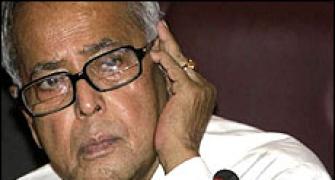Expressing concern over the crisis that has ravaged Eurozone, Prime Minister Manmohan Singh said on Tuesday that the developing world may be hit by these recessionary trends and urged the rich nations to adopt quick and effective measures 'to prevent the global economy from slipping into a double-dip recession'.
"The sovereign debt crisis in Europe and recessionary trends in the traditional engines of the global economy -- the United States, Europe and Japan -- are sending negative signals to world financial and capital markets which are showing signs of distress," the prime minister said addressing the plenary session of the IBSA Summit in Pretoria.
"Developing countries cannot remain untouched by the negative impacts of these developments. Their ability to address their developmental challenges has been adversely affected," he said.
Reiterating the prime minister's thoughts, the other IBSA leaders -- Brazilian President Dilma Rousseff and South African President Jacob Zuma -- too expressed anxiety over the deterioration of the global economic scenario, which presents particular challenges for the economic policy and growth prospects of developing and low-income countries.
With downside risks increasing substantially in recent weeks, the IBSA leaders stressed the importance of the implementation of a credible plan of macro-economic and financial policies and structural reforms by the Eurozone countries, as a necessary step to prevent further negative shocks to the world economy.
All the three IBSA leaders also highlighted the importance of complementary measures by other key developed economies to boost recovery and help the global economy as a whole.
Emphasising that only domestic policy responses and structural reforms are not sufficient to restore growth, the three leaders stressed upon the need to increase policy coordination amongst G-20 nations.
Coordinated effort by the G20 on this issue could help avert a new recession and promote robust recovery, leading to strong, sustainable and balanced growth of the global economy in the medium term.
The prime minister and the leaders of South Africa and Brazil agreed that to boost the slumping global economy, a carefully calibrated fiscal consolidation in countries with high debt levels is needed. Simultaneously, it is also necessary to take steps that will help strengthen domestic demand in nations that have large surpluses.
IBSA believes that Brazil, India and South Africa are doing their part to promote growth while containing inflationary pressures and ensuring fiscal discipline.
With G-20 Summit scheduled to be held in Cannes early November, the prime minister said that IBSA countries should coordinate their stance in the days preceding the summit to ensure that the developing economies' priorities are reflected in the negotiations of the grouping.
The three leaders stressed the importance of implementing the current international commitments of financial regulatory reform, with a view to improving oversight and supervision, towards a more resilient financial system. They also renewed their commitment to the timely implementation of the Basel III agreement.
Another aspect on which the leaders were in agreement was the need for and importance of a more stable and resilient International Monetary System and more transparent capital flows.
The IBSA declaration also spoke about the Doha Development Round negotiations that were launched on the basis of a mandate which seeks to put the interests of developing countries at the forefront.
The leaders said that the deadlock in the negotiations is a matter of concern and the distortions caused by the protectionist policies of and agriculture subsidies in the rich nations continue to hurt the development prospects of developing countries, especially the poorest ones.
The IBSA reiterated its view that the demands of the current negotiations portray an imbalance with the developed countries' sensitivities having been taken onboard along with the 'unjust demands on developing countries to open their markets in the services and industrial sectors'.'
The three leaders said that to overcome the impasse and to bring the Round to a successful conclusion, there was a need to re-affirm the integrity of the mandate that launched the Rio Round and urged the WTO members agree on measures of interest to least developed countries






